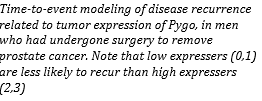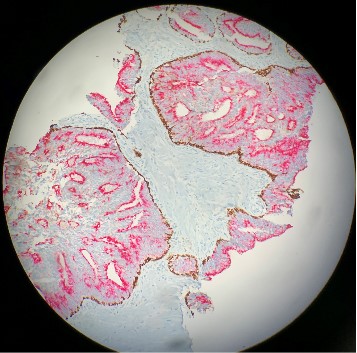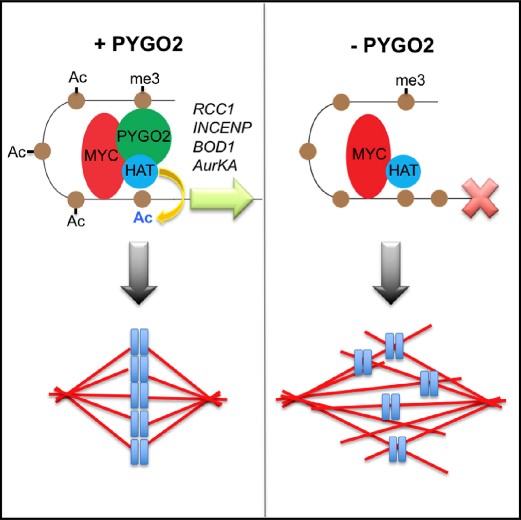Faculty A-Z

Ken Kao
Professor of Oncology B.Sc., M.Sc., Ph.D. TorontoBioMedical Sciences Cancer
Assessment of risk factors for prostate cancer
My research has focused on identification of the risk factors associated with prostate cancer. Prostate cancer is the second most diagnosed cancer in men. In Canada, on average, 63 men are diagnosed with, and 11 men die from prostate cancer every day. Our recent findings have identified a protein called Pygo, which is expressed in tumors of men diagnosed with prostate cancer. Patients that have lower levels of expression of Pygo are likely to survive longer after treatment than those with higher levels. While Pygo might be used to prioritize patients with prostate cancer for more intensive care, it is not known whether it has any relationship to risk of developing prostate cancer.
.jpg)  |
The reason why Pygo was important was because we found that cancer cells in which Pygo was eliminated failed to undergo mitosis, proving that Pygo was required for tumors to grow. Importantly, we found that one of the deadliest cancer causing protein, called Myc directed the production of Pygo. It’s no wonder then that tumors that have lots of Pygo are more troublesome. |
My research now focuses on risk factors for developing prostate cancer. It has long been known that the male hormone, testosterone, is a key element that drives most prostate cancer, and it is on this understanding that treatment involves form of anti-testosterone treatment. The female hormone oestrogen, interestingly has been demonstrated to have an oncogenic effect on human prostate cancer cells grown in a petri dish. Because both male and female hormones are present physiologically, we are interested in understanding the role of the sex hormones on the initiation of prostate cancer. |
 |
Like many malignancies, invasive prostate cancer develops from a precondition called prostatic intraepithelial neoplasia, or PIN, which is viewed by doctors under the microscope. Very little is known about the factors that cause PIN, but a number of pioneering studies have identified that the loss of a handful of genes by mutation, will lead initially to PIN and then to cancer. Unfortunately it is not possible to directly study the systemic development of PIN or indeed most precancerous lesions in humans. An animal model, such as transgenic mice would be required to perform these investigations.
| We are interested in determining the effect of altering the sex hormonal milieu in male mice that are genetically prone to develop PIN. We want to know if experimental manipulation of these hormone levels will increase the severity or even promote the formation of cancer from PIN. Our research findings will be significant, as they will reveal whether sex hormone activity represents a risk factor for prostate cancer progression. **Currently accepting Honours students** |
  |
Selected PUBLICATIONS:
Dicks, Elizabeth; Pullman, Daryl ; Kao, Ken; MacMillan, Andree; Logan , Gabrielle; Simmonds, Charlene; Etchegary, Holly (2019) Universal tumor screening for Lynch syndrome: Perceptions of Canadian pathologists and genetic counselors of barriers and facilitators" Cancer Medicine, 8:3614-3622
Dicks E, Pullman D, Kao K, MacMillan A, Simmonds C, Etchegary H. (2019). Universal tumor screening for Lynch syndrome: perspectives of Canadian pathologists and genetic counselors. J Community Genet. 3:335-344
Gai L, Done SJ, Cook D, Denic N, Erivwo P, Voisey K, Kao K. (2018). Breast tumour resembling tall cell variant of papillary thyroid carcinoma: case presentation (in a patient with Lynch syndrome). J Clin Pathol. 11:1031-1032.
Andrews, P.G., Popadiuk, C, Belbin, T., and Kao, K.R. (2018). Augmentation of Myc-Dependent Mitotic Gene Expression by the Pygopus2 Chromatin Effector. Cell Reports. 23:1516-1529.
Kao, K.R., Popadiuk, P., Thoms, J., Aoki, S., Anwar, S., Fitzgerald, E., Andrews, P., Voisey, K., Gai, L., Challa, S., et al. (2017). PYGOPUS2 expression in prostatic adenocarcinoma is a potential risk stratification marker for PSA progression following radical prostatectomy. J. Clin. Pathol. 71:402-411.
Hasan, T, Truong, T, Gai, L, Baptista, A, Smith, A, Voisey, K, Denic, N., Erivwo, P., Li, S., Gonzales, P and Kao, KR. Effect of fixation time on breast biomarker reporting: A controlled study utilizing cell-line derived xenografted (CDX) tumours. J Clin Path, 70(10):832-837
Andrews P and Kao K. (2016). Wnt/β-catenin dependent acetylation of Pygo2 by CBP/p300 histone acetyltransferase family members. Biochem J. 473:4193-4203.
Tzenov YR, Andrews P, Voisey K, Gai L, Carter B, Whelan K, Popadiuk C, Kao KR. (2015) Selective estrogen receptor modulators and betulinic acid act synergistically to target ERα and SP1 transcription factor dependent Pygopus expression in breastcancer. J Clin Pathol. 69(6):518-26
Hasan T, Carter B, Denic N, Gai L, Power J, Voisey K, Kao KR. (2015). Evaluation ofcell-line-derived xenograft tumours as controls for immunohistochemical testing for ER and PR. J Clin Pathol. 68, 746-751.
Andrews PG, He Z, Tzenov YR, Popadiuk C, Kao KR. (2013) Evidence of a novel role for Pygopus in rRNA transcription. Biochem J. 2013, 453, 61-70.
*Tzenov YR, Andrews PG, Voisey K, Popadiuk P, Xiong J, Popadiuk C, Kao KR. (2013) Human Papilloma Virus (HPV) E7-Mediated Attenuation of Retinoblastoma (Rb) Induces hPygopus2 Expression via Elf-1 in Cervical Cancer. Mol Cancer Res. 11, 19-30.
